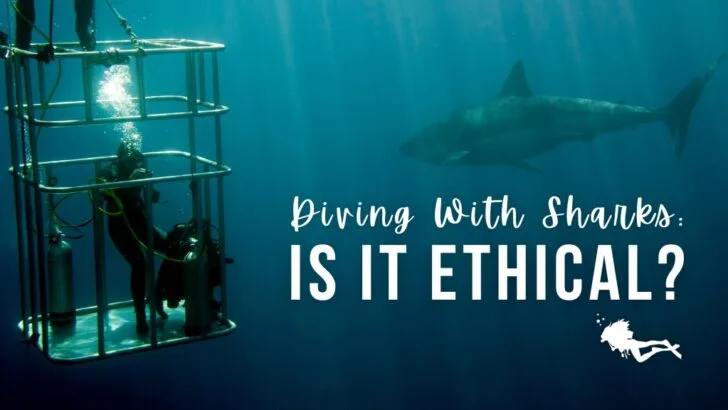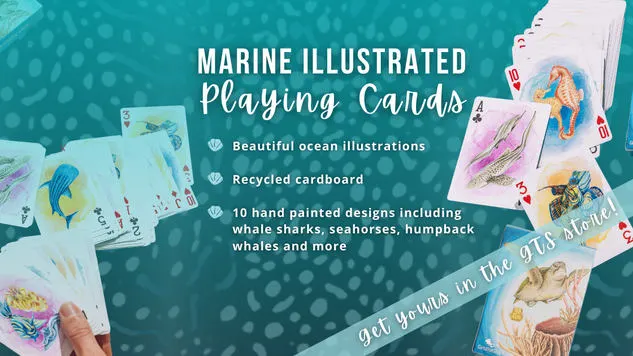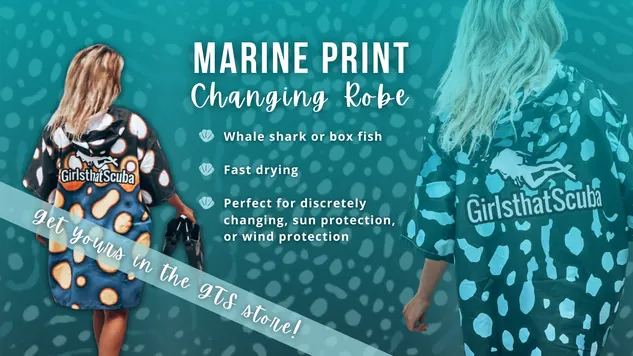Diving with sharks is a thrilling experience that puts scuba divers face-to-face with some of the ocean’s most fascinating creatures. While this might sound like a real-life nightmare to some people, to others, it’s a dream come true. However, the ethical implications of shark diving sparks concerns among many scuba divers. Here, we’ll dive a little deeper into the different types of shark dives. Join us as we explore the ethics of shark diving. We’ll also share a few destination recommendations for shark lovers!
Why Dive With Sharks?
Traditionally, sharks have been portrayed as cold-blooded killers in the media. However, as we’ve learnt more about their behaviour, it’s become clear that this isn’t the case.
In fact, sharks can display mammalian-like social behaviour and most species pose no threat to humans. Sadly, the reverse isn’t true – shark numbers have plummeted in the last half a century, largely thanks to human activities.
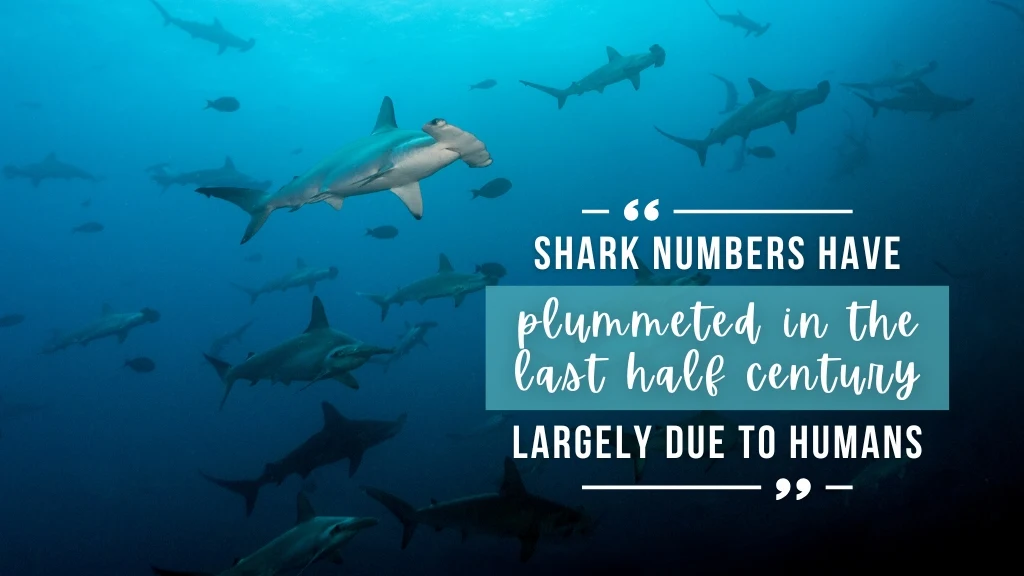
The plight of the misunderstood shark has led to a resurgence in shark conservation efforts, and attitudes towards sharks have slowly begun to soften.
Consequently, sharks are being found on the wish lists of avid scuba divers more often. Yet sharks can be difficult to spot on regular dives. To avoid disappointing the shark lovers, some tour operators have begun running specific shark diving trips.
What is Shark Diving?
Although there’s no strict definition of shark diving, it typically refers to dive trips focused on finding as many sharks as possible. Alternatively, it may be a trip for spotting certain shark species.
There are various ways this can be achieved. You can boost the odds of shark sightings by choosing your location wisely and diving at certain times of year. Alternatively, you can use bait to draw sharks towards you.
Depending on the sharks you expect to encounter, divers can be swimming freely or enclosed in protective cages throughout these experiences.
Boosting Chances of Shark Sightings
As a scuba diver, the least invasive way to dive with sharks is to simply boost your chance of encounters with them. This can be done in several ways.
For instance, you can tell your guide that you’re interested in diving with sharks. They can take you to the dive sites where sharks are often spotted, or they might know where they’ve been hanging out recently.
You can also maximise your chances of seeing certain shark species by learning about their behaviour. For instance, nurse sharks and black-tip reef sharks can often be found on the ocean floor. If you’re looking for whitetip reef sharks, check the small crevices and undercuts.
Diving in Shark Hotspots
In some locations, at certain times of year, you’re pretty much guaranteed to catch a glimpse of our finned friends under the water.
For instance, every year billions of sardines travel from Agulhas Bank up to Mozambique following a cold-water current. This phenomenon is known as the Sardine Run. Unsurprisingly, this mass migration attracts a lot of unwanted attention – unwanted for the sardines, that is! Sharks, dolphins and birds feast on the sardines as they travel, making for a truly spectacular show of animal interactions.
What’s more, you don’t even have to be a scuba diver to take part. You can see plenty of action from the surface. Other shark hotspots include the Bahamas, which is famed for hammerheads, Caribbean reef sharks, and tiger sharks. The southern and eastern coast of South Africa are best known for ragged-tooth sharks.
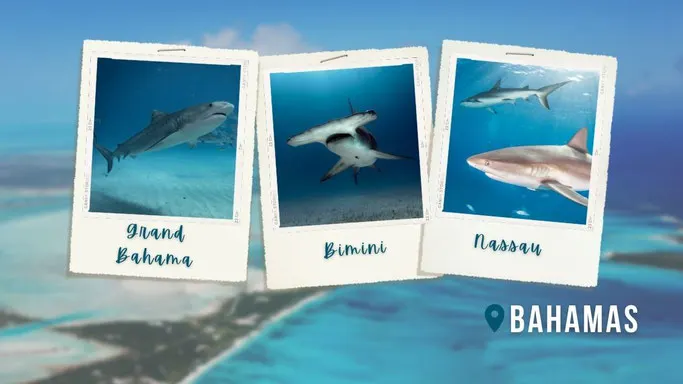
What is Shark Cage Diving?
Typically reserved for great white sharks, cage diving allows divers to get up close and personal with one of the world’s most notorious apex predators – all from behind the comfort of a solid cage barrier.
Divers or snorkelers are enclosed in a protective cage and lowered into the water. Snorkelers will remain just below the surface and are supplied surface air via a tube. Scuba divers have the option of descending deeper, usually to depths of 3-15m (10–45 feet). They can either breathe surface-supplied air or air from their tanks.
It’s worth noting that not all cage diving is for tourists. Shark cage diving is also used for scientific research and underwater photography and filming.
What Are the Ethics of Shark Diving?
In theory, shark diving is a viewing experience that’s no different to a safari. You enter the animal’s natural habitat and wait patiently for an encounter. In reality, however, there are a bunch of factors to consider when thinking about the ethics of shark diving.
Many of these are related to the use of bait to attract sharks. If done irresponsibly, this can alter the natural behaviour of sharks and has a ripple effect on the local environment.
Ecosystem Disruption
Regular chumming means that sharks are likely to visit an area more often in search of their next meal. Over time, this can cause an increase in local shark populations.
As sharks are apex predators, a change in their population can trickle down and destroy entire ecosystems, including coral reefs and seagrass meadows.
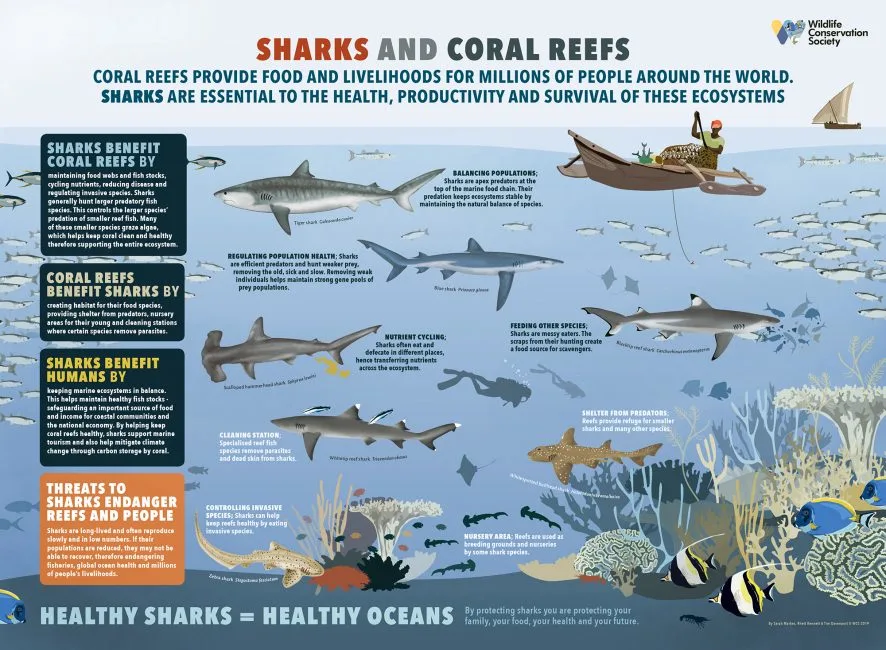
Human Safety
Rising shark populations can also negatively impact coastal communities by making the sea unsafe. This is why chumming for sharks has been illegal in Western Australia since 2012. Even film crews have been given the no-go when it comes to chumming.
This is mainly due to the concerns of local residents who fear that chumming will cause sharks to associate boats (particularly the sound of them) with food. Essentially, by taking part in a tourist attraction that lasts just a few hours, you might be taking away a beloved natural resource from local residents.
Shark Safety
Pumping out vessels full of eager tourists day after day is a recipe for disaster for sharks too. Boat strikes are bound to occur and, although they’re rarely fatal, they can seriously harm sharks.
What’s more, if shark populations get out of hand, and attacks on humans increase, there are a handful of locations where some governments will initiate shark culls to reduce attacks.
Awareness Versus Fear
Many people in the shark cage diving business are adamant that bringing people and sharks together is a good thing. These encounters boost awareness of sharks and the conservation pressures they’re facing.
In reality, diving with sharks, especially ones that are feeding, does little to raise sympathy. On the contrary, by offering shark diving as thrill-seeking experience, it can promote the idea that sharks are nothing more than killing machines.
Can Diving With Sharks be Ethical?
But it isn’t all doom and gloom. Don’t forget, there are ways you can boost your chance of seeing sharks on a regular dive without altering the behaviours of these fascinating creatures. If you’re set on catching sight of a shark, sightings are almost guaranteed at some locations in certain times of year – no bait needed.
Some of our other favourite shark-y locations are the Maldives, Cocos Island, Galapagos, Philippines, and Socorro. Click the buttons below to explore trips!
If that just doesn’t cut it for you and cage diving with a great white shark is on your bucket list, then all is not lost. There are some tour operators out there fighting the good fight – you’ll just have to do your research and pick one carefully.
Green flags to look for in a tour operator are:
- They have links with reputable shark charities.
- They’re willing to travel further out to sea, away from prime swimming spots.
- They have a good reputation. Try checking online (search the Girls that Scuba Facebook group) and asking locals in the area.
- They pick dive sites wisely instead of relying on bait. You can spot sharks on deep cage dives without using bait at all.
- They’re patient. If you don’t use bait, odds are it’ll take longer to spot a shark.

About the Author
Rose has spent the last few years living in Europe, the Seychelles and Kenya, working as a dive instructor, writer and conservationist. She’s back in the UK at the moment and is slowly acclimatising to cooler waters!

